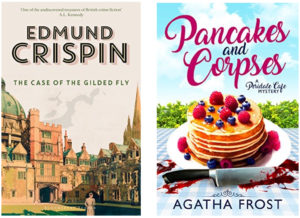Today’s the last day of April. A third of the year is over. Wasn’t yesterday New Year’s? At least while time’s flying, I’m having fun! Hope you are too!
If you’re a regular reader of this blog, you know I’m a reader. I prefer reading to TV, movies, video games, boardgames, you name it. Reading takes you to a million different worlds without leaving the comfort of your own home. Reading’s my favorite way to travel. Reading also stimulates the imagination like nothing else. And that’s a good thing.
Earlier this month, on Twitter, someone started the hashtag #IndieApril. The goal was to get people to buy, read, and review books written by independent author/publishers.
Being an independent author/publisher and reader, I was excited to jump on the bandwagon. After all, reading is a good wagon to jump on.
I ended up buying 7 books. Here they are:
The Tainted Dollar by Chris Derrick
Hotel Obscure by Lisette Brodey
Voyager by Carl Rackman
The Monkey Idol by KD McNiven
A Brother’s Secret by Andy Graham
Connor’s Gambit by Z Gottlieb
Into Armageddon by Jeff DeMarco
As beauty is in the eye of the beholder, so is a good book in the eye of the reader. And just as there is a lot of beauty out there, there are a heck of a lot of good books that just don’t get the press.
The editors who work for publishers are mere mortals. They put their shoes on the same way you and I do. They are biased and opinionated individuals whose job is to make money for the publisher, the businessman, they work for.
The stories are legion of editors who passed on the eventual bestseller. The stories are legion of editors who thought book X was the next Gone With the Wind — and it didn’t even sell 10 copies.
Why is this? It’s because publishers aren’t interested in art. They’re interested in money. How many bucks will they make on Book X versus Book Y? This makes sense if we understand that publishing is a business. The publishing house’s sole purpose is to make money for the owners.
Businesses exist to make money. It’s why Jeff Bezos started Amazon — to make money. To get rich if possible. It’s why Random House exists — to make money for their German and British owners. Publishers only see books as dollar signs.
For the last 50 plus years I’ve read in writing magazines and now on the internet, that bestsellers keep publishers afloat. On virtually all of their other books they lose money. The likes of Patterson and Rowling and King, enable publishers to publish the likes of you and me — if we can get past the gatekeepers (editors). And there were other bestsellers who allowed the publishers to gamble on Patterson, Rowling, and King.
As much as I don’t like the monopolistic mindset of Amazon, I’m forced to say that it was the Kindle that changed publishing forever.
Suddenly, overnight, not a single writer needed an agent or a publisher. Writers were free at last. There were no more gatekeepers to prevent our voices from being heard.
Publishing had suddenly become a true democracy. Publishing became as easy as buttering a slice of toast.
Of course, people have this proclivity to make easy things difficult. And so now we see indies themselves setting up all manner of roadblocks to prevent the newbies from entering the ranks of the august.
I hear constantly that one has to have an editor, maybe several! I was told by one nobody author that if I didn’t have money to hire an editor, I should hold a garage sale to raise the money to hire one. What idiocy! As if I have enough stuff I don’t want to make even $10.
Here are more must haves. One has to have a professionally made book cover. That one has to pay a formatter for a professionally formatted book. And one has to pay for lots of marketing.
What’s going on is simple. In the first place, all those editors that publishers have let go in the last 30 years are seeking to feed off of the indie revolution. Quite honestly, indies don’t need professional editors. We are our own publishing house of our own books. We don’t need someone who doesn’t know us to tell us what our books should or shouldn’t be.
In the second place, indies themselves — to eliminate competition — set up barriers to new writers. Of course there are no barriers to publishing today, so these people play the traditional publishing mind game and make gullible newbies think they need all the above mentioned crap.
The indie publishing waters are filled with sharks and piranha — let the newbie beware. I say ignore those naysayers and shysters. Just write and publish your book. Then learn how to market it.
Every day I’m amazed at the good indie writers I discover. Writers who’s books languish at the 500,000 or one million rank in the paid Kindle Store. Writers who are usually better than the indie bestsellers — most of whom are of no better quality than the traditionally published crowd.
On this last day of #IndieApril, I encourage you to pick up a book or two written by an independent author/publisher. Here are 10 suggestions:
Comments are always welcome! And until next time, happy reading!
Share This!